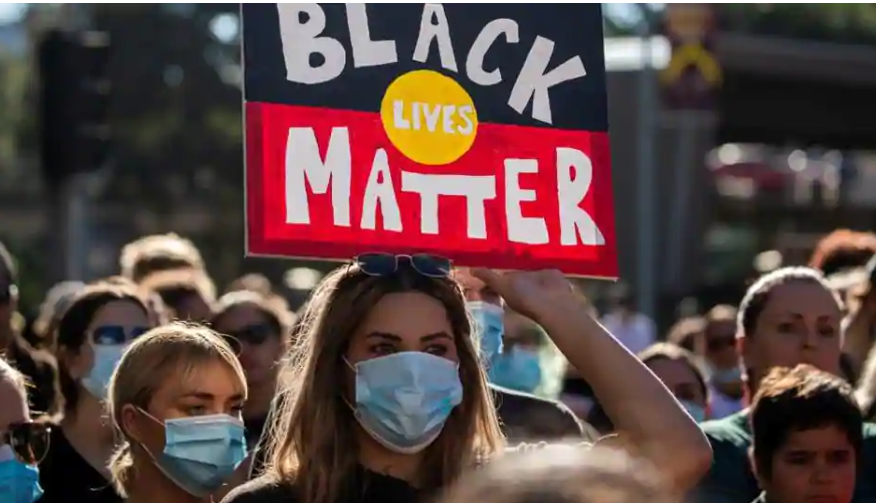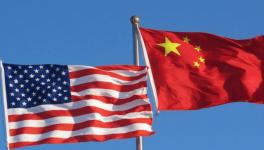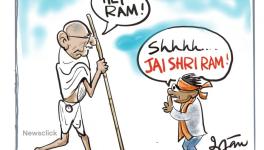#BlackLivesMatter and India: Right-Wing Allies with White Supremacists with Ominous Signs at Home

Image Courtesy: Reuters
Protests against the death of George Floyd, a 46-year-old African-American man, in police custody, have intensified across the United States. In solidarity with the US protestors, people have turned out in large numbers from cities like Amsterdam and Paris, where they have questioned their own country’s treatment of minorities and its systemic racial abuse. In India too, citizens put up #BlackLivesMatter on their social media as a gesture of their support for the protests. Rather unsurprising, however still curious, is the response of the Indian right-wing. Platforms with the support of the RSS-BJP were seen lampooning and criticising the protests, and the #BlackLivesMatter theme in particular.
This article, for instance, in an infamous right-leaning web portal, put the word ‘protests’ within quotes, to raise doubts about the legitimacy of the movement demanding justice for George Floyd. While the article is understandably primarily concerned with the ramifications of those protests in India given the trends #MuslimLivesMatters and #DalitLivesMatter, it has broadly insinuated that the protests are mindless acts of vandalism, discounting the innumerable peaceful protests against institutional racism in the US.
The position that this website takes is identical to that of the Alt-right and supporters of President Donald Trump, both of whom have sought to focus exclusively on the violence, and downplay or ignore the excessive force used by the police and the US National Guard (similar to the RAF and other paramilitary forces in India). In another article, the same portal sought to link the protests with the anti-CAA protests in India, and further denigrate Muslims by hinting that it is an Islamic fundamentalist conspiracy at play in the US. The portal has also made it a point to target Antifa, the decentralised group opposed to white supremacy in the US, calling it a ‘radical far left group’, another fillip to the heady cocktail of McCarthyism and anti-Muslim rhetoric on display.
This article, in another portal, recognises that the killing of Floyd was due to police brutality, and even goes on to say that anti-racism protests should not be “abhorred”. However, at the same time, it seeks to label protests in the US as “an excuse for anti-social elements to wreak havoc across the United States under the shroud of anti-racism protests (sic)”. The primary thrust of the article, however, is Europe, where the protests that have taken place in solidarity, also question the state of race-relations in the respective countries. The intent of the article is to question the very foundation of multiculturalism, an idea that has shaped institutions like the European Union, and which allowed for a mildly compassionate response to the refugee crisis of the Middle East in 2015.
The opposition to multiculturalism and immigration, has been, in a sense, the raison d'etre of right-wing formations that sprung up in Europe and the Western hemisphere since the financial crisis of 2008. Now, the Indian right-wing has joined in, discounting the irony that millions of Indians migrate to these very countries. The article also focuses on the flouting of social distancing norms, an admirable stance, probably coloured by the inability of the writer to see that President Trump was dead against a lockdown and wanted people to return to work amid mounting COVID-19 cases. In a Facebook Post by the same platform, the protests in the US are shown as an opportunity for Trump to polarise voters by looking to be tough on rioting, and doing well at the impending Presidential elections in November.
The Indian right has had a rather complex stand on foreign policy, which has been, for the most part, guided by political expediency at home. I remember seeing articles from the RSS’ Hindi weekly, Panchajanya, praising the Israeli state for tackling the insurgent movement for the liberation of Palestine, as far back as the 1970s. The stand was self explanatory, in lieu of the common enemy being Muslims, but that never translated into any outpouring of support which might have also reflected in policy, whenever the right-wing came to power. It was in fact Atal Bihari Vajpayee as External Affairs minister in the Janata Party government of the late 1970s, who led the re-establishment of diplomatic relations with the People’s Republic of China, after years of belligerence following the war in 1962. The Nehruvian tinge to foreign policy continued during the first NDA government (1998-2004) which Vajpayee led. He shot down the request of his foreign minister, Jaswant Singh, to join the post 9/11 US led ‘war on terror’. India not only refused to participate in the allied invasion of Iraq, but at least officially deplored war, even as it can be argued that India had effectively become a strategic ally of the US by that time. In its official rhetoric, India, under the first NDA regime, continued to be seen as pro-Palestinian, with Vajpayee supporting a Palestinian state in no uncertain terms.
The Modi led regime has, like many other things, dispensed with a lot of such niceties regarding foreign policy, and in continuation with their amplified rhetoric against all things associated with the first Prime Minister of India, made it a point to showcase their foreign policy shifts – such as India’s repeated abstention on UN Human Rights Commission resolutions condemning the Israeli excesses, and the refusal of Mr. Modi to visit the Palestinian Authority while being the first Indian Prime Minister to visit Israel in 2017 (though he did visit Ramallah one year later, separately). It is a fact that the Indian right-wing can be much more open about its allies and foes internationally, now that it has acquired not just unbridled power, but a wide and deep hegemony in substantial aspects. Hence, it can confidently dismiss pro-Black protestors and ally with the US Alt-right. It all started with the open embrace of Trump, who endeared himself with his anti-Muslim diatribes when the community was increasingly on the Hindu nationalist radar at home. The all too publicised scenes of an extra parliamentary Hindu far right group conducting a hawan for the victory of Trump, represents widespread praise for not just the man, but implicitly his white supremacist views as well.
The alignment with the Alt-right and white supremacist thought represents a metamorphosis which has involved the jettisoning of the entire anti-colonial legacy and sympathy with anti-imperialist struggles, which extended to the Civil Rights Movement in the US.
One of the more understandable reasons for the Hindu right-wing to denounce #BlackLivesMatter is a perception that Muslims sympathise with the campaign. Scenes of militant protests in the US are just enough to touch a raw nerve with the Indian right due to protests against the controversial Citizenship (Amendment) Act, which saw massive participation of Muslims for months.
However, evidence suggests that Muslims might not be the only scapegoats. The right-wing influence on government means that it is difficult not to see even aspects of lip service paid to the shared legacy of anti-oppression struggles being eroded. The unambiguous positions taken by the RSS, or at least platforms which lean towards it, has significance within India itself. Traditional bias towards fairness has been quite pronounced in mythology, equating it with goodness, while dark skin is a refrain for everything gone awry. The importance of fairness creams in our society is another reminder of how not-so-subtle symbolism affects mindsets. India has seen regular cases of violence and abuse directed at students from Africa, which can only worsen if the Indian right-wing leans closer to ideological anti-Black prejudice elsewhere.
With a complicated geographical, social and linguistic diversity with a past history of contentions, implicit race prejudice being given sanction by ideology, posits a challenge. The southern states’ history of tensions with the north, are one such example. There were deeply disturbing instances of hate-mongering when the state of Kerala went through its worst floods in decades. There were organised campaigns directed at discouraging relief donations since the Malayalees did not conform to the image of a society best in tune with how the RSS, influenced heavily by its Indo-Gangetic social base, sees it. The concept of ‘Unity in Diversity’, so cherished and central to the idea of Indian federalism, cannot profit out of a reinforcement of the idea of white supremacy borrowed from the US and Europe.
There is a corollary to the shared stance of the Indian and American right on #BlackLivesMatter- China. Ever since Trump called the pandemic a ‘Chinese Virus’, and accused the country of deliberately concealing facts to abet its spread to the US, dozens of columns and op-ed pieces have appeared in Indian right-wing platforms in support of the stance. An obvious correlation might be made to the very recent symbolic campaign of uninstalling Chinese-invented mobile applications. More significant was an incident in the national capital when a Manipuri student was spat on by a passer-by and referred to as ‘Corona’.
The writer is a PhD student at Centre for Media Studies, Jawaharlal Nehru University. The views are personal.
Get the latest reports & analysis with people's perspective on Protests, movements & deep analytical videos, discussions of the current affairs in your Telegram app. Subscribe to NewsClick's Telegram channel & get Real-Time updates on stories, as they get published on our website.























